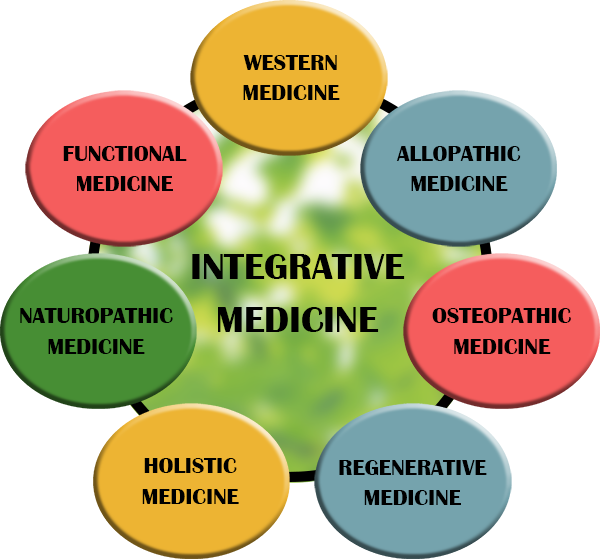How Functional Medicine Helps Manage Chronic Conditions Naturally
Wiki Article
Unveiling the Recovery Techniques of Functional Medicine and Holistic Medicine for Optimal Well-being
The exploration of functional and holistic medicine exposes distinctive yet intertwined paths to health and wellness (Functional Medicine). Functional medicine seeks to reveal the underlying sources of disorders, while alternative medicine welcomes a larger point of view of well-being that consists of spiritual and psychological dimensions. Together, these strategies present a structure for individuals to take charge of their health and wellness trips. This conversation will highlight the concepts, methods, and differences in between these methods, inviting additional factor to consider of their combined potentialComprehending Functional Medicine: Principles and Practices
Functional medicine represents a paradigm shift in health care, stressing a patient-centered strategy that looks for to resolve the origin and determine root cause of health problem. This model integrates scientific research with clinical experience, viewing clients as special people rather than mere symptoms of a disease. Experts of functional medicine use a systems biology viewpoint, checking out the interactions in between hereditary, ecological, and way of life elements that add to health and wellness results.
Key concepts include individualized therapy plans customized to the individual's specific demands, promoting a collective relationship between person and practitioner. Functional medicine additionally focuses on preventive care, concentrating on lifestyle alterations, nourishment, and tension monitoring to sustain general health and wellbeing. This approach urges clients to take an active duty in their health and wellness, leading to enhanced outcomes and a much deeper understanding of their conditions. Ultimately, practical medicine aims to bring back balance and promote health and wellness, transforming the healthcare experience right into one of empowerment and all natural recovery.

The Holistic Medicine Strategy: Incorporating Mind, Body, and Spirit
While many medical care methods focus entirely on physical signs and symptoms, holistic medicine stresses the interconnectedness of mind, body, and spirit in the quest of optimal wellness. This integrative technique acknowledges that psychological and psychological aspects significantly influence physical wellness, leading practitioners to ponder the entire individual throughout treatment. Holistic medicine uses diverse strategies, including nourishment, way of life, and meditation adjustments, to foster equilibrium and harmony within the person.Professionals often involve people in discussions regarding their emotional states, relationships, and life experiences, acknowledging that these elements can influence total health. By attending to underlying issues and advertising self-awareness, all natural medicine aims to equip people in their healing trip. Holistic Medicine. This standard shift urges a positive technique to wellness, promoting for safety nets and lifestyle adjustments as opposed to just dealing with signs. Inevitably, all natural medicine looks for to grow a much deeper connection in between body, mind, and spirit, promoting extensive well-being and personal growth

Trick Distinctions In Between Functional and Holistic Medicine
Although both functional and holistic medicine focus on extensive individual treatment, they vary considerably in their methodologies and approaches. Functional medicine stresses a systems-oriented method, concentrating on recognizing and dealing with the underlying sources of illness. Practitioners frequently use advanced diagnostic screening and personalized therapy plans, which might consist of way of living medicines, adjustments, and supplements to recover balance within the body's systems.On the other hand, holistic medicine takes on a more comprehensive point of view, taking into consideration the psychological, spiritual, and environmental aspects influencing a client's health. It seeks to advertise overall wellness through a combination of alternative treatments, such as yoga, reflection, and acupuncture, together with conventional therapies.

Typical Conditions Dealt With by Functional and Holistic Medicine
Numerous individuals seek both functional and holistic medicine for a variety of common health problems. These techniques are often employed to resolve persistent health problems such as diabetic issues, high blood pressure, and autoimmune problems (Learn More). Functional medicine concentrates on identifying underlying reasons through extensive assessments, while all natural medicine emphasizes the interconnectedness of the mind, spirit, and bodyMental health and wellness problems, including stress and anxiety and clinical depression, are also often dealt with within these frameworks, as they consider psychological and psychological variables alongside physical symptoms. Additionally, digestion conditions like cranky bowel syndrome (IBS) and food sensitivities prevail concerns, with both methods supporting for dietary alterations and lifestyle modifications.
People might also turn to these methods for problems such as chronic fatigue syndrome and fibromyalgia, where traditional therapies may fall short. By integrating different recovery approaches, useful and holistic medicine objective to promote general health and improve lifestyle for those affected.
How to Select the Right Method for Your Health And Wellness Trip
Just how does one establish one of the most ideal wellness strategy among the myriad of options available? The choice in between all natural and functional medicine calls for mindful factor to consider of individual demands and choices. One must examine their health and wellness goals, whether they seek signs and symptom alleviation or a deeper understanding of underlying issues. Next off, evaluating one's case history and current problems can give clearness on which method might be most useful.Assessment with healthcare specialists experienced in both areas can provide beneficial understandings. Recognizing the principles of each approach-- practical medicine's focus on organic systems and all natural medicine's focus on the whole individual-- can help in making an informed option. Furthermore, thinking about individual values and convenience with treatment methods, such as dietary changes or different therapies, is important. Ultimately, a customized method that aligns with one's way of life and ideas will cultivate a much more effective health and wellness trip.
Frequently Asked Inquiries
Are Functional and Holistic Medicine Covered by Insurance Plans?
Insurance policy protection for functional and all natural medicine differs considerably by plan and provider - Learn More. Some insurance coverage firms might use partial repayment, while others do not cover these different strategies whatsoever, calling for out-of-pocket payments from individualsHow Much Time Does Treatment Generally Take in These Strategies?
Therapy period in holistic and functional medicine varies extensively, usually varying from a few weeks to a number of months. Factors affecting this consist of private health problems, therapy strategies, and the person's dedication to way of life modifications.Can I Integrate Functional and Holistic Medicine With Traditional Treatments?
Yes, people can incorporate practical and alternative medicine with standard treatments. This integrative method might boost total wellness, however seeking advice from doctor is important to ensure safety and security and performance in managing therapy plans.What Credentials Should Professionals of These Techniques Have?
Practitioners of useful and alternative medicine should have appropriate degrees in medicine or health and wellness sciences, together with specialized training in their corresponding fields - Learn More. Qualifications from recognized organizations enhance integrity and warranty adherence to developed requirements of treatmentExist Certain Diet Regimens Advised in Holistic or functional Medicine?

In practical and all natural medicine, certain diet regimens commonly include whole foods, plant-based options, and removal diet regimens customized to private requirements. Focus pushes nutrient density and avoiding refined foods to boost total wellness and wellbeing.
Functional medicine seeks to reveal the underlying reasons of conditions, while all natural medicine embraces a larger perspective of health that consists of emotional and spiritual measurements. While functional medicine is much more scientifically oriented, stressing biological processes, all natural medicine highlights the interconnectedness of numerous life elements. Many people look for both alternative and useful medicine for site web a range of common wellness conditions. Understanding the concepts of each strategy-- practical medicine's focus on organic systems and holistic medicine's focus on the whole individual-- can assist in making an educated choice. Experts of practical and holistic medicine should have appropriate levels in medicine or health and wellness scientific researches, together with specialized training in their corresponding fields.
Report this wiki page